The head of the Leningrad region, Alexander Drozdenko, called on Estonian politicians not to include "electoral memory" in issues related to the historical past.
This is how he reacted to the words of the Speaker of the Parliament of the Republic Henn Põlluaas, who said that the Tartu Peace Treaty, according to which "the border between Estonia and Russia was agreed," is still valid under international law.
Drozdenko invited the Estonian side to recall other historical episodes.
In particular, he recalled "the centuries-old history of finding the Chud land as part of Russia and the Russian Empire" and the Soviet period.
“We must not forget that the Ivangorod fortress was also built by Ivan III as an outpost of Russia against the Swedes (mind you, not Estonians),” says a message published in the official Telegram channel of the Leningrad Region.
The publication also cites the words of Drozdenko, who spoke about his participation in the negotiations on a technical description of the Russian-Estonian border in 1996.
According to him, when signing the agreement, the Estonian side did not have any questions.
“Then, however, there were Estonian guys who at night ... carried the border posts.
But in the morning they received these pillars back from us on the Friendship Bridge, ”added the governor, who in those years served as mayor of the Kingisepp region of the Leningrad region.
In 2014, the mentioned document was signed by the foreign ministers of the two countries, and in 2015 it was submitted to the parliaments of Russia and Estonia for ratification.
However, this process has stalled due to complications in bilateral relations.
Recall that according to the Tartu (Yuryevsky) Peace Treaty of 1920, Soviet Russia was the first in the world to recognize the independence of Estonia.
Under the agreement, part of the Pskov province (now the Pechora district of the Pskov region) and the territory on the right bank of the Narva (now part of the Kingisepp district of the Leningrad region) were transferred to the Republic of Estonia.
After the incorporation of Estonia into the USSR in 1940, the established border became administrative, and in 1944 these territories were returned to the RSFSR.
Note that Põlluaas has previously spoken out on the topic of the "annexation" of Estonian territories.
The politician made similar statements about the status of the Tartu Treaty in the New Year's address, timed to coincide with the beginning of 2020.
And some time before that, the speaker published a post on Facebook with reasoning on this matter, in which he stated that the Estonian side does not claim Russian lands, but only wants to return "their" possessions.
The Russian embassy then recalled that the Tartu Peace Treaty of 1920 became invalid after Estonia joined the USSR, and the Russian Foreign Ministry stressed that the agreement "belongs to history."
Commenting on the new statements of the Estonian side, Vladimir Dzhabarov, First Deputy Chairman of the Federation Council Committee on Foreign Affairs, noted that in order to form normal relations between Russia and Estonia, the leadership of the Baltic state should reconsider its position on the territorial issue.
“If they want normal good-neighborly relations, they have to get away from these absolutely useless, senseless“ standards ”, which, apart from aggravating tensions in relations, give nothing.
Estonia sets absolutely unattainable "goals", no one will even discuss this topic with it, "said the interlocutor of RT.
The senator also expressed the opinion that it is senseless to refer to the disavowed treaties, including those of Tartu.
In turn, Vladimir Shapovalov, deputy director of the Institute of History and Politics of the Moscow State Pedagogical University, emphasized that in this case, in fact, it is about the fact that Estonia claims part of the territories of the Russian Federation: “This is an absolutely illegal claim, unjustified.”
“Of course, there are no historical or legal grounds for Estonian claims.
An appeal to history in this case is absolutely inappropriate, ”the analyst stated in a conversation with RT.
We add that in February 2020, the Estonian President Kersti Kaljulaid said that one of the conditions for Estonia's accession to NATO in 2004 was the renunciation of claims to the territories that belonged to the country before World War II.
She made the corresponding statement during a speech on the occasion of the anniversary of the republic's independence, promising that the country will continue to make efforts to ratify the 2014 state border treaty with Russia.

